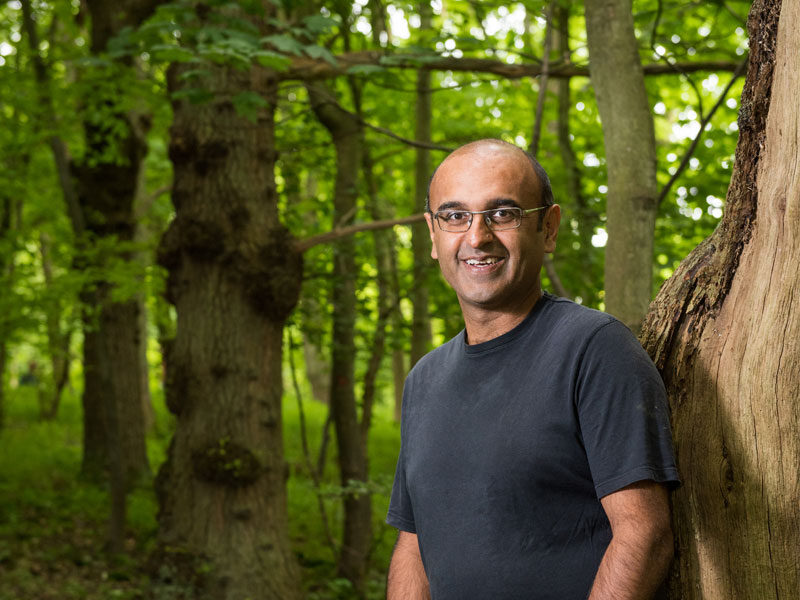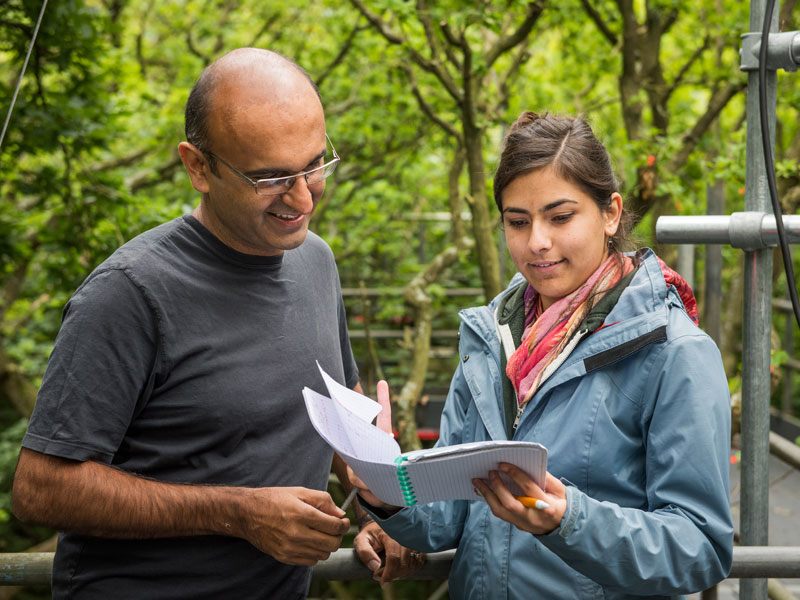Over the course of his academic career, Professor Yadvinder Malhi has been to places around the world that some of us could only ever dream of visiting. ‘To give you a quick snapshot,’ he says, ‘I started my tropical research in the Amazon. I focused on Brazil for several years, but then after that I started working in Peru, going from the lowland Amazon up through the slopes of the Andes, and into Bolivia in the dry forests. In the last few years I’ve been working more in Africa, with a particular emphasis on Ghana, Gabon and Ethiopia, as well as on Borneo in Asia…’ The list continues.
As Professor of Ecosystem Science at the School of Geography and the Environment, and Programme Leader in Ecosystems at the Environmental Change Institute, Yadvinder Malhi is used to travelling for work. His research focuses on the way in which ecosystems are responding to contemporary global change, from climate change through to logging, degradation, hunting and other forms of direct human use. ‘I’m interested in terrestrial ecosystems worldwide,’ he explains, ‘although I’m particularly interested in forests, and within that there’s a focus on tropical rainforests – we work in all the major tropical regions.’
Tropical ecosystems play an important role in the Earth’s water and carbon cycles, significantly influencing what Professor Malhi describes as ‘the global climate system.’ Despite this, and the fact that more than half of the planet’s biodiversity is found in tropical rainforests, they’re often understudied when compared with other regions.
I think that without the vision that the philanthropy has provided, it wouldn’t have been possible – we wouldn’t be where we are now.Professor Yadvinder Malhi
Around a decade ago, in order to help him understand the function and traits of these forest ecosystems, Professor Malhi established the Global Ecosystem Monitoring network (GEM). There are now in excess of 80 GEM plots operating in the tropics.
‘We’ve really pioneered things in terms of not just taking a snapshot, but monitoring these forests over time,’ he explains. Thanks to a dedicated team of researchers – local collaborators and Professor Malhi’s own research staff and students – there is now an almost continuous global operation in place, so that ‘at each of these sites, on almost the same day, measurements of the same things are being taken, to the same protocol.’
By looking at the rates of litter and root production, and the amount of CO2 passing through the stems, soil and leaves, each GEM team is able to describe the entire cycling of carbon, nutrients and energy through the forest they monitor. This data has given Professor Malhi a new understanding of the way that forests differ from one another, as well as how they respond to extreme weather events.
Professor Malhi’s attention is currently focused on the strong El Niño event that increased global temperatures by around 1°C last year, and resulted in severe drought in many parts of the tropics. ‘We’re uniquely positioned to track these forests through these droughts, and then for several years afterwards,’ he says. ‘In fact we’ve just been awarded a research grant to specifically analyse the impacts of this event on the GEM network.’

For Professor Malhi though, the bigger, longer-term question is to understand the sensitivity of the biosphere to global climate change. Forests currently absorb around a quarter of the CO2 contained within human fossil fuel emissions. ‘If the forests weren’t absorbing this CO2,’ Professor Malhi says, ‘the rate of global warming would be around 20–30% faster than it is currently. So they’re playing a substantial role in slowing down the rate of global warming.’
One major uncertainty, however, is around how long this will last. ‘Is there a danger’, he asks, ‘that with sufficient warming or with sufficient droughts, this absorption of CO2 will actually become a release of CO2 from the forest? So that this “brake” on climate change could become an accelerator of climate change?’ An important clue is that during El Niño events, forests stop absorbing CO2 entirely. ‘We see this on a global scale,’ states Professor Malhi, who is hoping to use GEM to understand why.
I feel immensely lucky to work on something that provides enormous personal satisfaction, while also, hopefully, contributing to the welfare of the planet.Professor Yadvinder Malhi
The discoveries made by his team will be key to informing our response to climate change. Last year’s Paris Agreement specified that any change would need to be limited to below 2°C of total warming. However, as Professor Malhi points out, ‘all of these calculations are based on what the biosphere has been doing until now. If forests stop absorbing carbon dioxide, then for the same amount of CO2 you get more warming – and so we have less leeway in how much more CO2 we are able to emit before we hit dangerous levels of global warming.’ The forests’ reaction will ultimately determine how tight the coming climate change bottleneck will be.
Although he will continue to investigate the immediate impact of the El Niño event, Professor Malhi’s ultimate aim is to leave a legacy of long-term ecological monitoring across the globe: ‘I’d like for these forests to act as “canaries in a mine”; as early warning systems, so that we’re able to spot any changes happening in the biosphere much earlier. Our challenge now is to find the funding that secures this monitoring for decades to come.’

Oxford’s Wytham Woods play a pivotal role in this vision. Owned by the University for over 70 years, this temperate woodland has become an important research facility for Professor Malhi’s team. Within the forest, a wooden walkway enables researchers to access the canopy leaves, and treetop sensors allow it to act as a key calibration point for satellites measuring forest biology, chemistry and function. ‘You only need a few of these calibration points across the world’, Professor Malhi explains, ‘in order to produce a coherent map of the carbon cycle of the entire planet.’
Thanks to the woodland’s protected status, and the University’s active ecological research programme, Wytham has the potential to provide valuable climate data for the long term. In order to say the same for GEM’s tropical plots, however, Professor Malhi believes the key lies in building global scientific capacity, and ensuring that a network of talented students and researchers has the skills to inform international policy and practice. ‘And you know that as they develop,’ he concludes, ‘we’ll keep working with them, and collaborating with them for the rest of their lives – and that’s the brilliant thing.’
Professor Malhi’s global research is supported by, amongst others, The Gordon and Betty Moore Foundation. His post at Oriel College is supported by The Frank Jackson Foundation.